Frank Wo/Men on Building K ! :D D: Ö
December 8, 2020
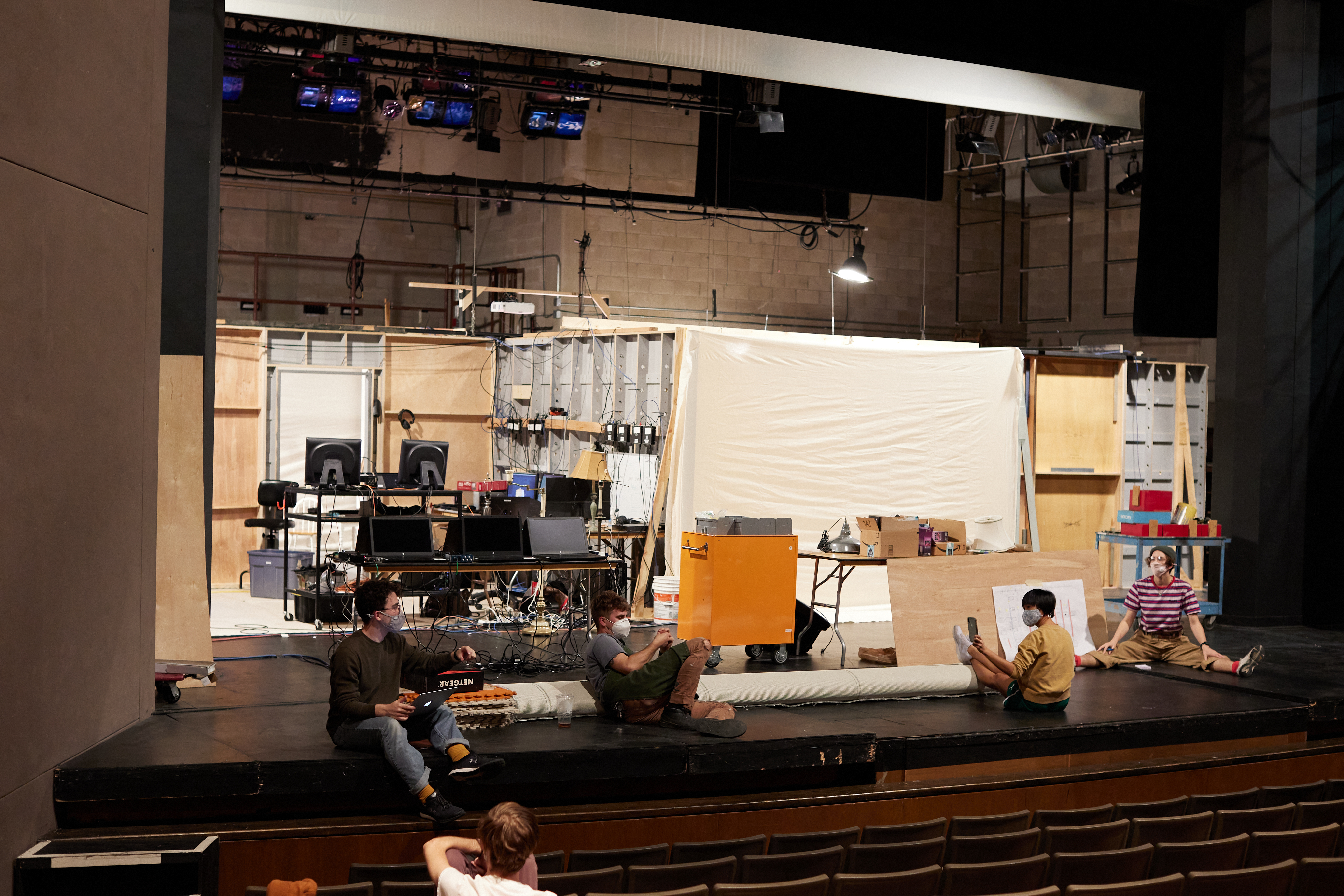
Frank Wo/Men Collective, based out of Austin, TX, is an ever-evolving group of interdisciplinary artists who create devised, experimental performances. Their work is informed by “intersectionality, Queerness, Freudian curiosities, body positivity, and absurdist exploration.” The founding members and co-producers are Kelsey Oliver, Alexa Capareda, Roberto Di Donato, and Chris Conard, but they collaborate regularly with a group of diverse artists. For their TPA + Fusebox residency, the collective have taken over the McCullough Theatre to develop the new show, K ! 😀 D: Ö (don’t worry, they’ve told us that every pronunciation is the right one). One of their most ambitious projects developed to-date, Frank Wo/Men have built an entire house onstage, complete with a bedroom, closet, living room, bathroom, and garage, which will serve as the container of their performance. During this pandemic, when so many of us are sequestered in our homes, separated from the world by a screen, and feeling uncertainty about the future, Frank Wo/Men are reaching back to childhood for the comfort of nostalgic memories, impulses, and objects, which will inform a series of interactive performances, and forge a connection between their home and yours.
Filmed from multiple perspectives, the many performances that make up K ! 😀 D: Ö will be streamed to virtual audiences watching at home, but rather than being passive voyeurs, audience members are invited to interact with the performance through a newly designed user interface, and influence the environments and narratives as they unfold. Fusebox Co-Artistic Directors Anna Gallagher-Ross and Ron Berry recently spoke to the collective about how they formed, how they work, and the ambitious creative development challenge they’ve set for themselves with K ! 😀 D: Ö.
Frank Wo/Men are looking for virtual audience members to help them test these interactions through a series of virtual workshops December 12 + 13th, 2020. For more information and to register click here.
Ron Berry: We wanted to start with an origin story question. How did you come together to form Frank Wo/Men?
Kelsey Oliver: Frank Wo/Men started without the intention of becoming a collective. It was more that we wanted to do a show together. Our first show in January 2017 called Loose Gravel was an impulsive two-week process of “Let’s do something because we can!” We all knew each other from either University of Texas at Austin, Austin dance community affiliations, or mutual theater friends, and so it kind of was a right place/right time thing…
Roberto Di Donato: Ever since I graduated from UT, I wanted to form an official way of making theater like with a group of people, so I was definitely interested in us coming together.
Alexa Capareda: I think for me it became real when we decided to make a Facebook page!
(Laughter) Chris Conard: I met Kelsey after seeing a show that she had choreographed, and she was talking about all these ideas for a new show she was producing at this art gallery, and it sounded like so much fun, so I asked, “Can I help? Little did I know that I was going to be heavily involved in producing a show with no budget; only twenty amps of power; trying to heat a space in the freezing cold; and keep dancers safe and warm. And there were sharp edges everywhere. But with this group I just saw so many incredibly talented individuals that came together and made something that was truly unique and devised. And the process felt really exciting to me because everyone’s voices were heard and vocalized, and there was a lot of trust in the group, and knowing that if you were in that role you were going to deliver no matter what.
Anna Gallagher-Ross: Speaking of sharp edges and other challenges, I think the first show I saw of yours included a food fight between yourselves and the audience, another was a performance that immersed everyone in water. Could you talk about the creative challenge you’ve set up for this new show?
RDD: With every show we’re like, “This is the biggest, most challenging thing we’ve ever done! There is nothing bigger!” Every time we are wrong. This show is our toughest, hardest, most complicated tech show to date, and I think the challenge we’ve set is having a live audience interact with live performers via the internet—that has a lot of sharp edges.
CC: A lot of the problems we’ve encountered in the past with the development of new work are budget limitations, and with this show we’ve had an opportunity to really explore resources in a way that we haven’t had the ability to—not only in space, but in time, and also in the materials, and software, and technology. We’re employing 20 computers, 5 projectors, multiple networks, and everything is talking and working. We’ve also built a house on the McCullough stage. It has a bedroom, closet, living room, bathroom, and a garage. We could have shot this at home, but at home you couldn’t have punched a hole through the wall or climbed through two walls, or use the kinds of camera angles that we’re getting. We’ve created a set that is responding to something about the pandemic that we are all very familiar with, and that’s seeing into each person’s home in some format.
KO: This is not just a home space but a curated home space that we get to imaginatively fuck up however we want, and be in proximity to each other in a way we wouldn’t be able to otherwise. It’s trying to test the physical and virtual parameters of interaction and I think at the same time there is a really cozy home curated feel to this devising process. We’re bringing more of ourselves into the work, retracing childhood cravings, memories, items, and then magnifying those voices in this really awesome playground of a space.
RB: Cool!
AC: We approach each show and set these huge, mountainous challenges, and with this one, as a performer and collaborator, it’s really cool to have the set and tech in place before we start really shaping the show. We did a lot of homework before getting into the theatre to build our world and sort of figure out the needs of what we are making, but nothing is more clear and more inspiring than being in the actual space in which we can build and imagine doing the thing.
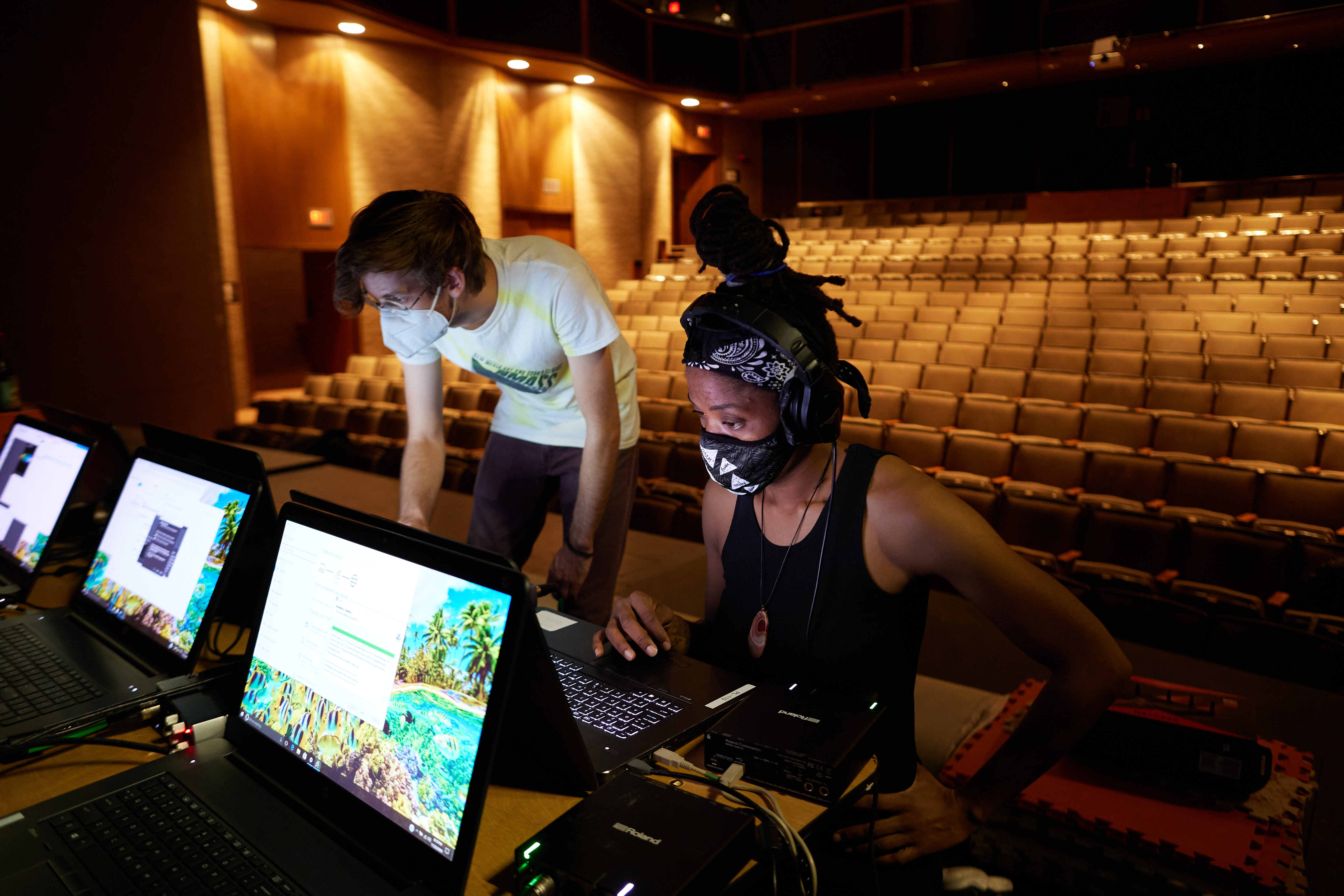
AGR: I love the title of this new project. Where did K ! 😀 D: Ö. come from?
AC: It sort of stems from us playing around with the word “kiddo” because we were using childhood as a point of exploration, our childhood imagination and curiosity, and I think that maybe it came out of the pandemic and needing to find what’s important.
AGR: I’m interested in this idea of nostalgia or reaching backwards during this current moment because, in a way, it’s so difficult to look forward. Could you say more about this?
RDD: There’s a couple of layers to it. [For example], I am currently living outside Austin, and was coming home to work on the show. And I always get that feeling of what it’s like to come home again every time I return, and some conversations came up about things that we did as kids in certain spaces in our homes. And then we started working towards a theory for the show, or a technique, which for me is a clown technique that is based on childhood desires and tendencies.
KO: I think a lot of our explorations thus far have been curious about our inner childhood voices, or how sounds or music can remind our bodies of impulses or cravings we used to have, what items evoke memories. And even beyond that, I think we’re trying to figure out drop-in techniques of just being in our present self. So it’s like a coexistent force with our current adult selves.
AC: I think part of looking to our youth is also about tapping back into what it means to be human. We’ve had conversations about how we can become more open citizens, and be more a part of the social justice movement, and how we talk about that, and how we really find what is meaningful and what is important right now, and how we can be to each other. And in addition to that, during this time we also need brightness, comfort, to find a way back to that.
RB: How much of these things were y’all exploring anyway, versus how much has this COVID moment cracked things open or allowed you to reflect on in different ways?
CC: When the pandemic happened I became particularly interested in how we can think about the future of live entertainment and live theater. I know that the pandemic era, as I’ve been referring to it, is something that isn’t going to be short lived, and will inevitably have an influence on live entertainment for quite some time. And the truth of the matter is you can’t really come up with the solution. Everyone sort of builds off of each other’s ideas. The Wright Brothers didn’t fully ‘invent’ the airplane, they didn’t just create the first propeller, or the first motor or the first wing. They were bicycle mechanics first. And if we use a similar analogy with our collective here, we are all bicycle technicians and we’re trying to put a few things together and invent something that may only fly for a few seconds but, it will be an opportunity for others to recognize that there is a growth to be had in our field.
AGR: If this is like an experimental bicycle that you’re building, can you talk about what each of you contributes to that process?
RDD: I think I might be the chain or the pedals. Where you change gears. I am largely pushing dramaturgy. Not in a historical sense, but in terms of plot, or how you’re following the characters through the story. Because in this work you get to choose who you follow and there’s potentially five different plot lines that you can start out in. Kelsey and I are co-directing this show. I see my job as curating, cultivating the performers ideas and the space, because each performer gets to decide what room they’re in, and what it looks like, and how it interacts with them.
KO: I feel like I’m focused on communication between all of the collaborators. I have a craving for everyone to feel really heard and valued, and to encourage them to keep throwing ideas into the mix. “What if this, what if this, what if this, what if this?” So it’s kind of like, I don’t know, I’m like, trying to be oil, but I’m just like, throwing it on the bike in spurts, you know? And like, it helps probably, ultimately, but there’s like a lot of messiness to it.
CC: Alexa’s the headlamp.
(Collective Laughter)
AC: As an artist, for the past few years, I have already been working on my relationship to camera as a mover. In my recent piece Alexa… which was featured in Fusebox Festival: Virtual Edition in April 2020, I was thinking about control, agency, and interactivity. I’ve explored so many different ways of documenting my body, and so for this piece, where the medium is film and angles, it feels like part of that continued exploration, and actually feels very comfortable for me. I do feel like I’m the one trying to continue to communicate to those outside our inner circles. I love how we [Frankies] all end up with this sort of same mind-think, and weirdo, like, understanding of the world that we’re living in so clearly. Often I’m trying to think, how do we communicate that outside of ourselves, “How is this going to translate to anybody else?”
RDD: Chris, are you the handlebars?
CC: I think the rest of the group of collaborators are the handlebars. They’re also the pedals, yeah. They’re pushing it forward.
AC: You’re the frame?
CC: Yeah, maybe in this particular show I’m the frame just because I’m trying to connect and support everybody, and I’m trying to not think about all of my own impulses, but just help everyone else see their dreams come to fruition.
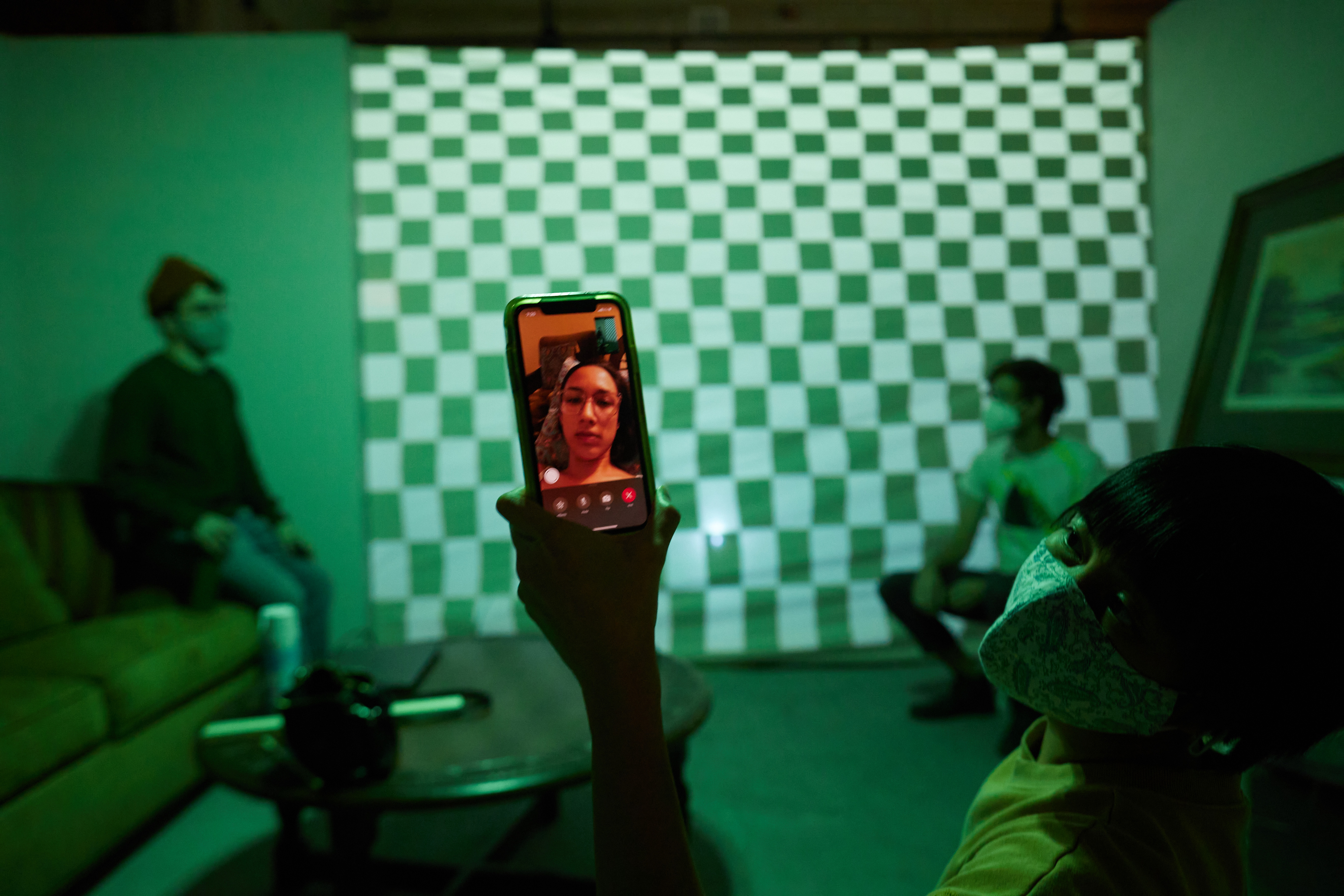
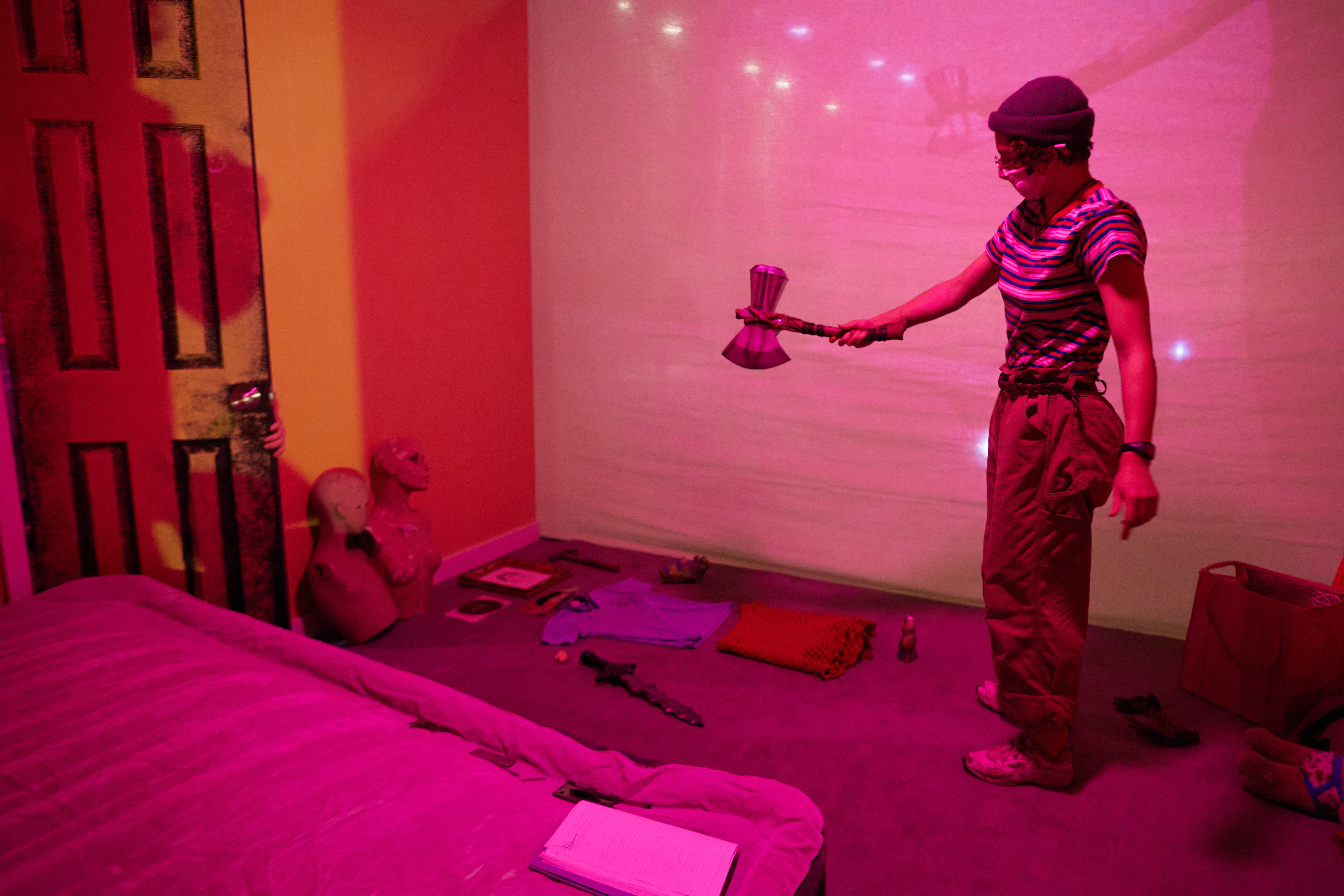
RDD: Speaking of Fusebox Festival: Virtual Edition, ever since then, we’ve been thinking about this virtual context and asking, “How can we curate the viewer’s experience?” from the moment they say, “We want to watch the Frankie show.” The whole experience from when you see advertisements online till the end of the show. That ended up being one of our primary goals for this development process.
AC: That’s another thing that is really cool about each show that we’ve come up with. With Loose Gravel we began with this loose gravel of ideas, and it was during that show that Chris threw out the idea of wanting an audience to throw food at us, and so that became our next show, TISKETTASKET. After that, we had this idea of using these letters from an old sign to spell something, and we ended up spelling “Rick Said So,” and we had no idea what the heck that was going to be but we knew we wanted that to be the name of our next show. And that show developed from that. And then then this whole world of Rub A Duck exploded from just that idea of using water in a performance. And then with this new work, just knowing that the medium through which we would interact, is online through an interface, and thinking about safety, or separation, and rooms, or, just the surreality of now. And that bubbled into what this is.
KO: Like Alexa said, in between shows we’re having conversations about the next show. Many, many Google Docs and texts of weird ideas, So it’s like, “put it in the pot,” you know? Put it in the pot and then it continues to morph from there…
AGR: You bring incredible collaborators into the fold for each show you create. Could you talk about who is collaborating with you on this project?
AC: We sort of have a revolving door of Frankies. There are some that have stuck with us for, you know, since the beginning, and some that have three shows, or two shows, even though, you know, I mean once you’re Frankie, you’re always a Frankie. I’m the co-producer, PR director, performer; Chris Conard is our technical director, scenic and lighting designer, and integrated media co-designer; Roberto Di Donato and Kelsey Oliver are co-directing, and KO is also co-costume designer; Khali Sykes and Erica Saucedo are performing/collaborating, and there are a few brand new Frankies, Schivona “Schi the God’ Johnson who is our new sound engineer and collaborator.
CC: Can confirm – she’s a God.
AC: True. So it’s been so awesome because in addition to creating these amazing soundscapes, she’ll move with us, she’ll dance with us and create. She has such an embodied practice. She’s very Frankie in a way that we are all very multi-talented people. Aaron Flynn is our costume designer (he designed our initial Jiggle Pets costumes for Fusebox’s FuseBash earlier this year).
KO: Aaron is doing this entire process long distance, remotely. He’s joining in on Zooms and making these costumes and going to send them over.
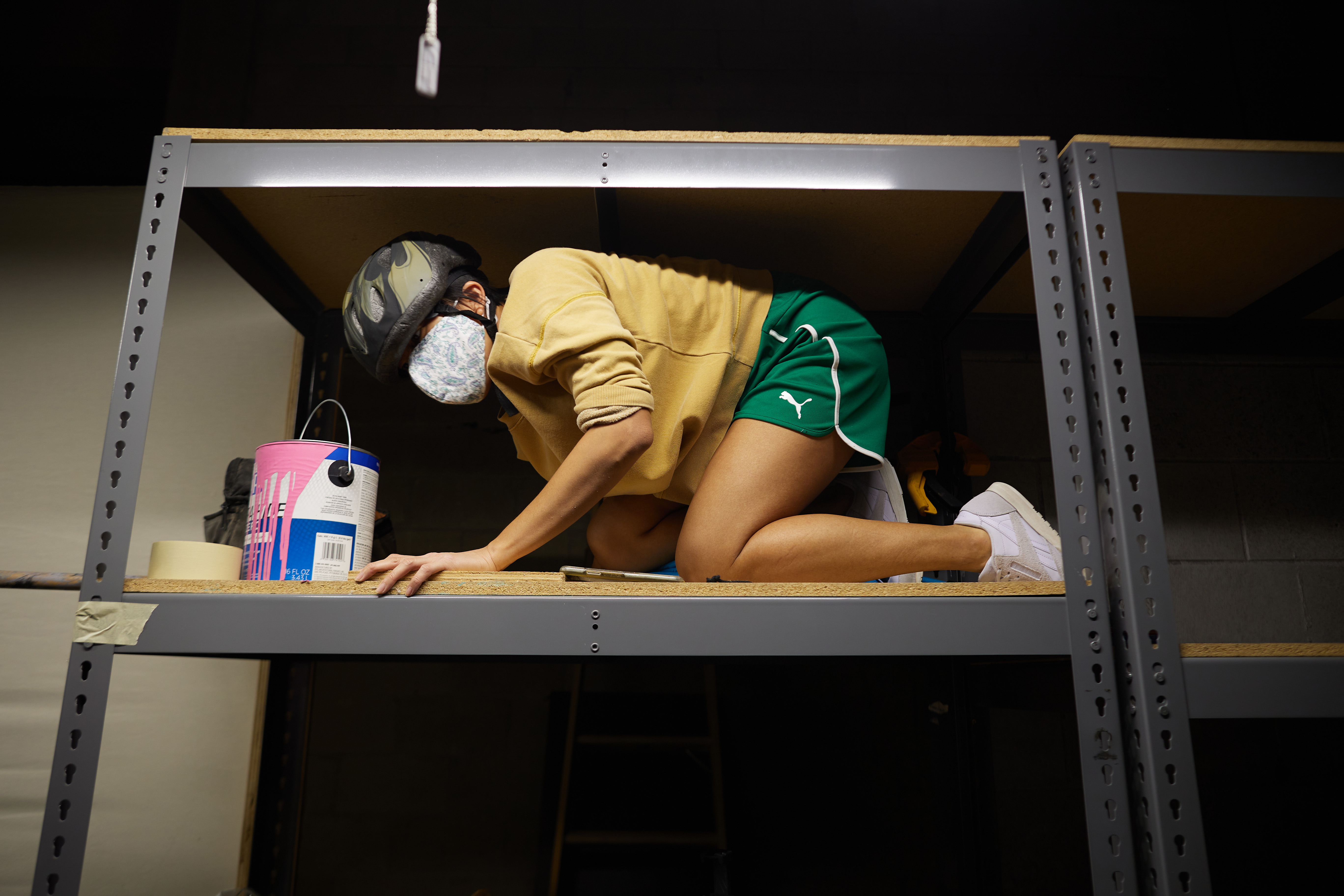
AGR: Oh wow! That’s impressive.
AC: And then, a few more brand-new Frankie’s: Michael Bruner, who we really needed this time around. He’s our integrated media co-designer and engineer and web developer. He and Chris have had a really dynamic relationship because they are building this thing that has never existed before: a website interface that people can interact with and that has a specific look, and that works in our theatre space.
CC: Michael is the tech wizard that can solve literally any problem that you have at your fingertips. Quite frankly this workshop process could never have existed without Michael.
AC: Tori Reynolds is our documentarian / editor / camera movement and installation collaborator.
KO: Tori has been focused on the performer-to-camera experience, and helping us create these magic tricks in the rooms of the house. And then Chris and Michael are making those magic tricks become interactively magical through the user interface.
AC: So it’s basically five people behind the scenes: Chris, Michael, Schivona, Tori, and Aaron, and five people you’ll see on camera: Alexa, Kelsey, Roberto, Khali, and Erica.
RDD: We made a whole TV show with ten people!
RLB: That’s incredible!
AGR: This is amazing. Congratulations!
AC: I think we were all at a grieving place earlier this year and getting that email from y’all about the residency and speaking with you, Bob, and TPA, it has been really, really fruitful and just inspiring. We’re just super grateful for the resources and for the kick in the butt too. It’s like this energy shot, like we got sucked into this process, and now you can’t stop us!
(Collective Laughter)
RDD: We’re on our way!
RB: Go, go, go!
AGR: Thanks so much for sharing where you are at. We can’t wait to participate in your workshop this December!
FWC: Thank you!
Photo credits: Essentials Creative
Frank Wo/Men is one of four artists/collectives participating in the inaugural Performing Arts Residency launched by Fusebox Festival and Texas Performing Arts. The first of its kind in Austin, the residency program is geared towards adventurous Austin-based artists who are pushing the boundaries of performance and on the cusp of new projects, as well as furthering the values of diversity, equity, and inclusion in the local performing arts community. This interview is the second in a series of conversations we call “In Process,” with resident artists about their creation process.